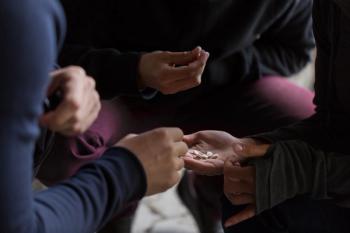
Managing mental health in adolescents with obesity
In part 3 of our obesity series, Candice W. Jones, MD, discusses how obesity affects mental health in children, along with how mental health can be managed in these patients.
Contemporary Pediatrics®:
Hi, I'm Celeste Krewson with Contemporary Pediatrics and I'm here with Dr. Candice Jones to discuss how pediatric obesity affects mental health in children. Do you want to introduce yourself?
Candice W. Jones, MD:
Hello, thanks for having me today. I’m looking forward to having this discussion.
Contemporary Pediatrics:
Can you talk a little bit about the stigma that children with obesity tend to face from their peers?
Jones:
Certainly, that's a great place to start. Weight bias and stigma are real, and children do you experience them as well as teens and adults and all of us, if we come across it. For example, peers, the peers of children and teens, in various settings, even family member person, outside authority figures at schools, or coaches or even in society at large as a whole, tend to or may shame kids with overweight and obesity, about their size and appearance. And it can make them feel shameful and feel disgrace about the obesity and about their appearance. Also, others may assume that encounter these children, they may assume things about them, and that's where that bias and prejudice come in, which may affect how they interact with those children. They may assume that they are lazy, couch potato, always eating or overeating, they may assume they're slow or incapable of certain things. And these children also often are teased about those stereotypes, and even bullied. So, all of these things weight—that fall under weight bias and stigma are harmful to children, and they're often incorrect about those children. But these are harmful messages that are sent to these children.
Contemporary Pediatrics:
And how does simply living with obesity affect the mental health of children, and how does the stigma contribute to these effects?
Jones:
So, there are many obesity-related health concerns, you know, from physical to mental. But the mental health aspect is one of those areas that we see. Because of that bias and stigma I mentioned, the weight bias and stigma towards kids with overweight and obesity, they may start to internalize those harmful messages that are sent to them and develop poor self-esteem, poor self-confidence, and body image issues. The bullying is not only physical, physically harmful to them, but can also be psychologically traumatic as well. So ultimately, these kids are at risk for depression, anxiety, disordered eating, and even suicide.
Contemporary Pediatrics:
And with all of this in mind, how can we help improve the mental health of children and reduce these risks?
Jones:
So, this is a loaded question, but a great question and I think this is the area that pediatricians and specialists from all fields of medicine are working on. We have to address these mental health concerns in children with overweight and obesity through a comprehensive multidisciplinary approach. This is a great time to be having this interview, because the AAP — the American Academy of Pediatrics has a new has new guidance on childhood obesity, and the message is exciting. It is moving away from watchful waiting; you know waiting to see if younger kids just outgrow their—the excess weight. We're moving away from that to now early intensive intervention. Because what we're seeing is these kids don't tend to outgrow their weight, as they did historically decades ago, so we need to detect it, address it early and start or to implement some strategies with the family in hopes that we can counteract or reduce weight early on. For example, you know, starting out as pediatricians with skills and motivational interviewing for, for the parents to make some interventions at home and, and get them motivated, also to encourage them to model well, with their eating habits and educate them on healthy diet, exercise. limiting screen time. So those are things that pediatricians can do within their clinics. utilize their anticipatory guidance, as well. But once the problem is there implementing lifestyle and behavior interventions that are more intensive, you know, utilizing nutritional coaching, or just the child seeing a nutritionist and the family. If that child if there are any signs through our screenings that we should be doing mental health screening in our children, especially in our adolescents and preadolescents, then therapy definitely is a modality that will be needed to address the self-esteem, confidence, and body image, even depression and anxiety issues that may come or that are present. And we're now looking more at utilizing medications and even surgical modalities to address overweight and obesity in children and teams. So, this is something that is very important that we do. And I think when we address some of the health-related physical health related issues with obesity, that ultimately also helps the mental health aspect. But also, pediatricians and parents need to have honest conversations about overweight, obese, and obesity when it's diagnosed and really focus on reducing shame and stigmatizing talk within the home and breaking down those bias-tight barriers. We may need to advocate more at schools for kids who are being bullied and continue to model appropriately for these children, because oftentimes, what's going on with the child may be going on in the family, with their parents and other children, as well. And so and then also just guiding the care so that children are getting care in all of these areas, and we know that there is a struggle, because some of these multidisciplinary approaches or strategies may not be available for certain individuals, you know, they may be living in a food desert, they may not have an academic center, where they can get to—where they can access the care that they need. And so pediatricians and parents, we need to get really creative, maybe we can utilize some of these modalities through telemedicine or webinar or developing programs, in schools and in clinics. But we definitely have to get creative to make this happen.
Contemporary Pediatrics:
Those are all great methods. Thank you for going over all that. And we're just about ready to wrap up. But is there anything you want to add first?
Jones:
No, I just encourage people to look at that new policy statement from the American Academy of Pediatrics. I'm still kind of dissecting it and learning from it and expanding my bandwidth in this area and hoping to change some of my practice in this area. So that would be the take-home message for pediatricians to address all areas of obesity-related health problems and children with overweight and obesity.
Newsletter
Access practical, evidence-based guidance to support better care for our youngest patients. Join our email list for the latest clinical updates.






